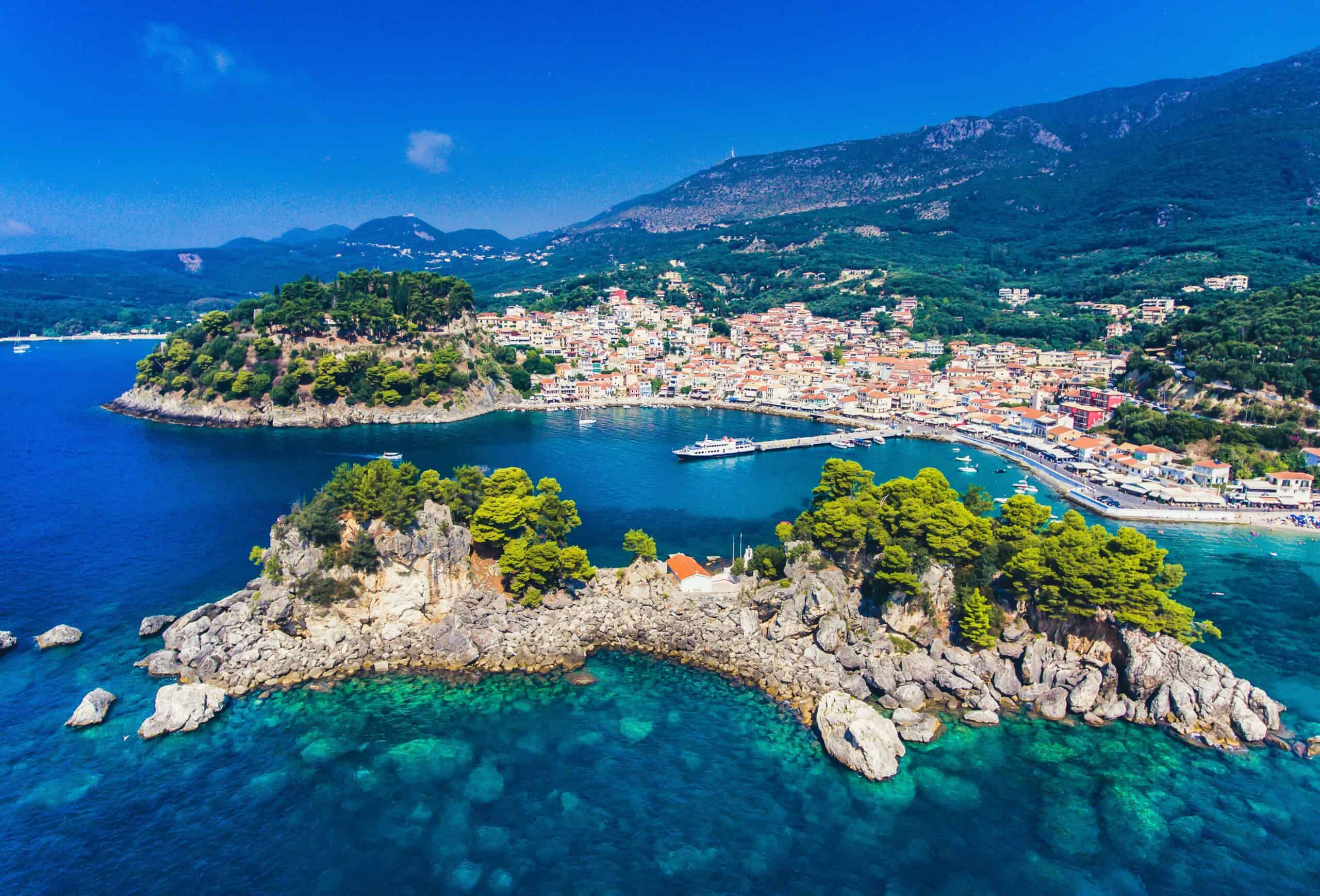When’s The Best Time to Visit Greece? Here’s 3 Answers Based on What’s Important to You

Greece is a top travel destination for many reasons – its stunningly beautiful coastline, its array of unique islands, its abundance of archaeological sites, its unique culture, and its delicious food and wine.
Whether you want to travel to Greece to see the historical ruins or relax on one of its beaches, it’s a destination with almost year-round sunny and warm weather.
But when is the best time to visit Greece? The answer depends on what you’re looking for in your holiday. Of course, if you want to avoid the crowds or skip peak prices but still have warm weather, you’ll need to plan a trip during specific times of the year. Here is a guide to the best time to visit Greece, depending on what’s important to you!
1. When the Best Time to Visit Greece: If Weather Is a Priority
Greece has a typical Mediterranean climate, with hot, dry summers and mild, wet winters. It’s one of the sunniest countries in Europe, and you can expect to enjoy 12 hours of sunshine a day in the height of summer. For the year as a whole, Greece enjoys different weather patterns. The season is not the same all over Greece – in the south, the weather is usually warmer and drier than in the north.
Spring: April to June
Spring is a great time to visit Athens and explore the ancient ruins without battling the crowds – as long as you travel during the first half of June when kids are still in school and families haven’t started to vacation.
Spring is also an excellent time to visit Crete, as the temperatures are not yet too hot, and the flowers bloom. The weather in Greece starts to warm up in April, and by May, it’s usually hot enough to sunbathe and swim. The average temperature in Athens is 60 Fahrenheit in April, rising to 69 Fahrenheit in May. The temperature is usually a few degrees warmer on the islands, such as Mykonos and Santorini.
The mainland and the islands are still green and lush in springtime, as the winter rains have not yet dried up. This is an excellent time of year to hike in Greece, as you can enjoy the fresh air and beautiful scenery without worrying about the heat.
The seas are still cooler at this time of year, so it’s not the best time for swimming. However, it’s still one of the best times to visit Greece since the weather is perfect for exploring – not too hot and not too cold.
Summer: July to End of August
The peak tourist season in Greece is summer when the weather is at its best. So if you want to enjoy the sunshine and the sea, and crowds and high prices won’t deter you, many think this is the best time to visit Greece.
The temperatures in Greece are sweltering in summer, with Athens averaging 83 Fahrenheit in July and 84 Fahrenheit in August. The islands are even hotter as they are closer to the sun. Mykonos and Santorini, for example, have an average temperature of 86 Fahrenheit in July and 87 Fahrenheit in August.
The sea is also warmest in summer if you spend a lot of time in the water swimming, doing water sports, or on sea-based excursions. If you want to enjoy the beach, this is one of the best time to visit Greece.
However, summer is also the busiest time of year, so you must book your accommodations and flights well in advance. Prices are also at their highest during the summer months.
Autumn: September to November
Autumn is a great time to visit Greece; the weather is still warm, and families and most visitors have already gone home. You can enjoy the sunshine and the sea without battling the crowds. If you want to see, the leaves change color, head to the mountains, where you can also enjoy cooler temperatures this season.
The temperature in October is around 67 degrees Fahrenheit, and in November, it’s about 59 degrees. The water’s still warm enough to swim in, but it can be cooler than during the summer months. As a result, the islands are less crowded, and the prices are lower.
Autumn is also a great time to visit because you can enjoy the harvest season. The grapes are ripe and ready to be made into wine, the olives are harvested, and the honey is at its best. You can also enjoy the mushrooms that grow in the autumn forests.
The best thing about autumn in Greece is that you can enjoy the country’s quiet and beauty without the crowds.
If you ask many Greeks who now live outside of the country When’s the Best Time to Visit Greece, their answer will most likely be Fall. In fact, one replied specifically the second half of September. The weather and ocean are still warm, the crowds have lessened, and prices have dropped from their summer peak.
Winter: December to February
Although it can be cold in Greece during the winter, there are still many things to do. If you don’t mind the cold and come for mostly tours and exploring the history of Greece, this is a great time to visit. You can also visit archaeological sites without the heat and crowds.
The average temperature in December is around 53 degrees Fahrenheit; in January, it’s about 50 degrees, and in February, it is about 51 degrees. The water’s too cold to swim in, but you can still enjoy the beaches. There are also fewer tourists so you can enjoy the country without the crowds.
If you want to avoid the cold, head to the south of Greece, where it’s a little warmer than the mainland. When booking your accommodation, check if it has heating as not all places do.
2. When is the Best Time to Visit Greece: High to Low Seasons
Greece is a year-round destination, but the shoulder seasons (spring and fall) offer the best weather if you want to spend time on the beach or touring around the islands without fighting the crowds.
The high season runs from June through August, when temperatures are at their hottest, and most tourists flock to Greece for summer vacation or August when most of Europe is out of the office on holiday. Therefore, accommodation and flights will be more expensive during this time as there is a demand to support it.
The low season runs from November through March, with cooler temperatures and fewer tourists. Hotels, restaurants, and other attractions may be closed or have reduced hours. However, you can find great travel and accommodation deals if you want to brave the cooler weather. Before booking a deal, make sure the bucket-list items you must do, are open during your visit,
3. When is the best time to visit Greece: Festivals and Events
Many festivals and events take place throughout the year in Greece. Let’s take a look at some of the most popular ones so that you can plan your trip accordingly.
1. The Carnival of Patras
This is one of the biggest and most famous carnivals in Greece. It takes place in February or March (depending on when Easter falls) and lasts for three days. The carnival features processions, costumes, music, and dancing.
2. Orthodox Easter (Greek Easter)
Orthodox Easter (or called Greek Easter by some) is an important holiday in Greece and is celebrated with much fanfare. It usually falls in April, but the exact date varies yearly. If you’re planning to visit Greece during this time, book your accommodation and travel well in advance as many places will be full.
3. Aegina Pistachio Festival
This festival takes place on the island of Aegina in September and celebrates the delicious pistachio nut. There are food stalls, cooking demos, and plenty of pistachios to eat. Pistachio-flavored ice cream is also a popular treat at this festival.
4. The Athens and Epidaurus Festival
This festival runs from June to August and features a variety of cultural events, including theater, music, and dance performances. Many events occur in ancient venues such as the Acropolis and Epidaurus Theater, making them even more special.
5. Nafplion Festival
This festival takes place at the end of June in Nafplion and celebrates the town’s maritime history. There are concerts, street performers, and stalls selling local produce. There are various venues around town that host different events. It features traditional Greek music and dancing.
So When’s The Best Time to Visit Greece? It Really Does Depend!
The best time to visit Greece depends on what you want to do while here. If you’re looking to spend time on the beach or enjoy the nightlife, April to October is the best time. However, if you want to avoid the crowds and experience Greek culture and history, then shoulder season in late Spring or early Fall is the best time for you. No matter what time of year you visit Greece, there’s always something to explore and enjoy.








